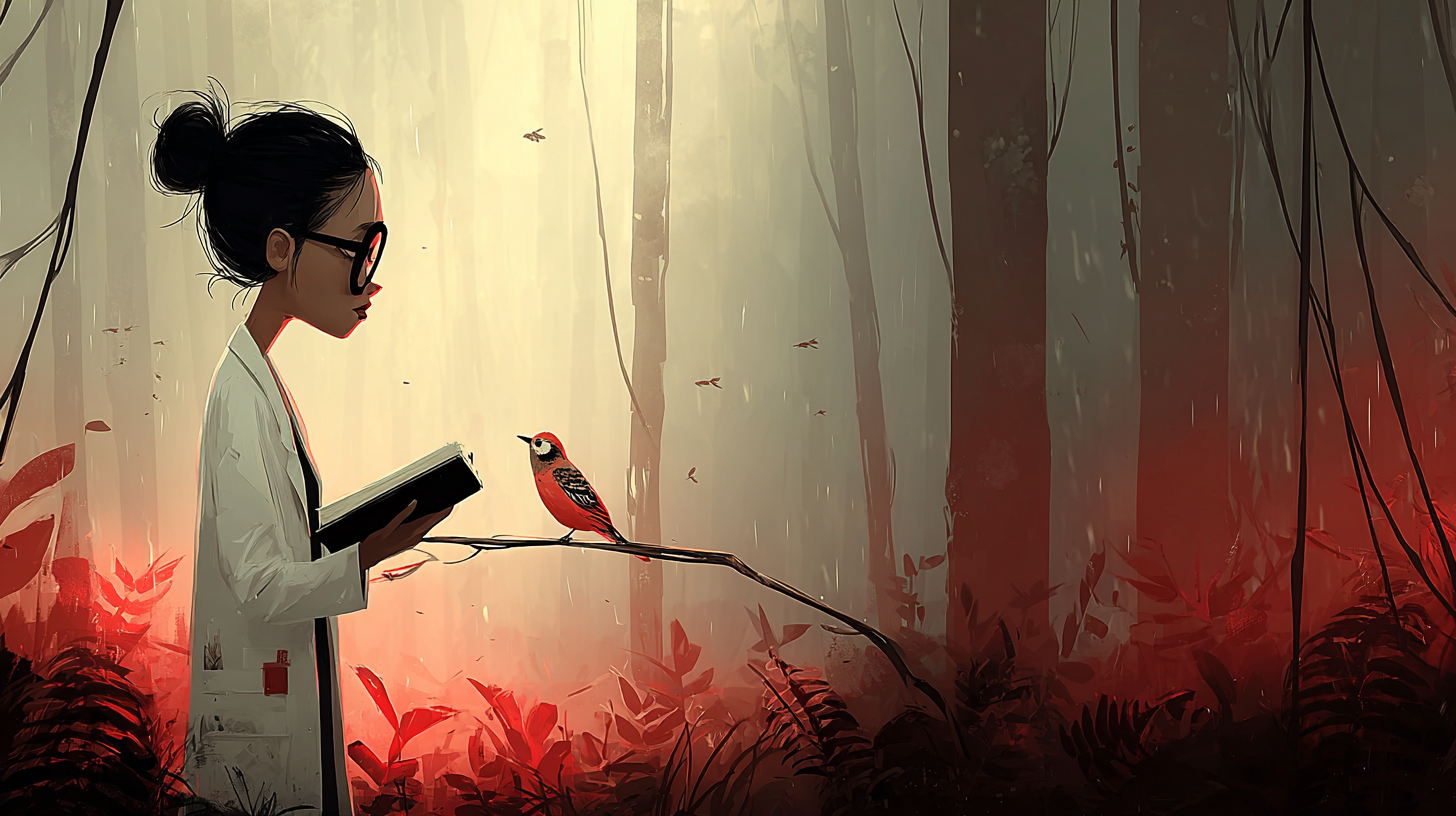species means a group of animals or plants that are the same kind.
species は「動物や植物のグループ(種類)」という意味。
以下は英単語 “species” に関するストーリー型学習コンテンツです。まずは大枠の意味を理解して最後の文章で確認しましょう。
主な意味(main meaning)
| 品詞 | 発音記号 | 意味 | 例文 |
|---|---|---|---|
| 名詞 | /ˈspiːʃiːz/ または /ˈspiːsiːz/ | 生物の種類、種 | Scientists discovered a new species of bird in the forest. |
語源(etymology)
ラテン語 speciēs(「見た目」「形」)に由来。
核イメージは「同じ特徴を持つまとまり」。
類義語(synonyms)
| 類義語 | 意味 | 例文 |
|---|---|---|
| type | 型、種類 | This type of fish lives in warm water. |
| kind | 種類 | What kind of tree is this? |
| category | カテゴリー、分類 | That book belongs to the science category. |
| group | 集団、グループ | The teacher divided the students into groups. |
反義語(antonyms)
| 反義語 | 意味 | 例文 |
|---|---|---|
| individual | 個体 | Each individual has its own personality. |
| whole | 全体 | We should look at the whole system, not just one species. |
コロケーション(collocations)
| コロケーション | 例文 |
|---|---|
| endangered species | The panda is an endangered species. |
| native species | The island has many native species of plants. |
| rare species | A rare species of flower blooms in this valley. |
| bird species | There are more than 500 bird species in this country. |
| plant species | The forest is home to many plant species. |
2項表現(binomials)
| 2項表現 | 例文 |
|---|---|
| plants and animals | The park protects many species of plants and animals. |
| life and death | The survival of a species often depends on the balance between life and death. |
英語ストーリー(english story)
Story: A New Discovery at the Research Center
Last summer, I worked as an assistant at a small research center near my town. The center mainly studied different species of plants and animals that lived in the nearby forest. Every morning, the team of scientists and I would go into the woods with notebooks, cameras, and measuring tools. Our goal was to record the number and condition of the species we found.
One day, something very exciting happened. While walking along a narrow path, one of the researchers, Dr. Smith, pointed at a small bird sitting on a branch. He whispered, “This bird looks unusual. It doesn’t belong to any known type of bird in this area.” We quickly took photos and made careful notes. Later, we compared it with books and online data. To our surprise, it seemed to be a completely new species.
We were all amazed. Dr. Smith explained, “A kind of bird like this is very rare. If it is confirmed as new, it will be an important discovery.” The whole team worked hard to gather more evidence.
That week, I also learned about the difference between groups of animals. Some belonged to common categories, while others were rare. Among them, there were some endangered species that needed protection. For example, a small native species of frog was slowly disappearing because of pollution.
In one meeting, Dr. Smith said, “We must think not only about individuals but also about the whole ecosystem. Every species, common or rare, plays a role in the forest.” His words reminded me that nature is a delicate balance of plants and animals, of life and death.
At the end of my internship, the research team sent their report to a science journal. They wrote about the possible new species of bird, and also about the importance of protecting endangered species. I felt proud to have been part of the project.
Through this experience, I understood that the forest is like a library of life. Every tree, flower, insect, and bird has a story. Some species are well known, while others are waiting to be discovered. It made me realize how important it is to protect our environment for the future.
和訳
研究センターでの新しい発見
昨年の夏、私は町の近くの小さな研究センターで助手として働きました。センターは主に近くの森に住むさまざまな species(種) の植物や動物を研究していました。毎朝、科学者のチームと私はノートやカメラ、測定器を持って森へ入りました。目的は見つけた species(種) の数や状態を記録することでした。
ある日、とてもわくわくすることが起きました。細い道を歩いていると、研究者の一人であるスミス博士が枝に座っている小さな鳥を指さしました。彼は「この鳥は普通じゃない。この地域にいるどの type(型) の鳥とも違う」とささやきました。私たちはすぐに写真を撮り、丁寧にメモを取りました。後で本やネットのデータと比べてみると、それはまったく新しい species(種) である可能性が高いとわかりました。
私たちはみんな驚きました。スミス博士は言いました。「このような kind(種類) の鳥はとても珍しい。もし新種と確認されれば、大きな発見になるだろう。」チーム全員がさらに証拠を集めるために一生懸命働きました。
その週、私は動物の groups(グループ) の違いについても学びました。よく見られるカテゴリーもあれば、珍しいものもありました。その中には守る必要のある endangered species(絶滅危惧種) もいました。たとえば、小さな native species(固有種) のカエルが汚染のせいで少しずつ姿を消していました。
会議の中でスミス博士は「私たちは個々(individual)ではなく、whole(全体) の生態系について考えなければならない。どんな species(種) も、一般的であれ珍しいものであれ、森の中で役割を果たしているのだ」と言いました。その言葉は、自然が plants and animals(動植物)、life and death(生と死) の繊細なバランスで成り立っていることを思い出させました。
インターンの終わりに、研究チームは報告を科学雑誌に送りました。そこには、新しい鳥の species(種) の可能性と、絶滅危惧種を守る大切さについて書かれていました。私はそのプロジェクトに参加できたことを誇りに思いました。
この経験を通して、森はまるで生命の図書館だと感じました。木、花、虫、鳥のすべてに物語があります。よく知られている species(種) もあれば、発見を待っているものもあります。私は未来のために環境を守ることがどれほど大切かを理解しました。
Q&A
Q: species と type の違いは?
A: species は「生物学的な分類(種)」を指し、科学的な場面で使われます。type は「型・種類」というより広い意味で、生物だけでなく物や性格などにも使えます。
Q: species と kind の違いは?
A: kind は「種類」という意味ですが、日常的な表現でよく使われます。species は専門的で、生物学的な話に限定されます。
Q: species と category の違いは?
A: category は「カテゴリー、区分」で、必ずしも生物に限らず本・映画・性格など幅広い対象に使えます。species は生物学に特化した分類です。
Q: species と group の違いは?
A: group は「集団」という意味で、必ずしも同じ種類ではなく、便宜上まとめた集まりを表します。species は「同じ特徴を持つ生物学的な種」です。
コロケーションとの違い
Q: species と endangered species の違いは?
A: species は単に「種」ですが、endangered species は「絶滅の危機にある種」を意味します。危機にあるというニュアンスが加わります。
Q: species と native species の違いは?
A: species は一般的に「種」を指しますが、native species は「その地域に元々生息している種」です。生まれ故郷に根付いているという意味が強調されます。
Q: species と rare species の違いは?
A: species は一般的な「種」ですが、rare species は「珍しい種」「数が少ない種」です。珍しさや希少性が含まれます。
Q: species と bird species / plant species の違いは?
A: species 単体では「種」ですが、bird species は「鳥の種」、plant species は「植物の種」と限定して表現しています。



コメント